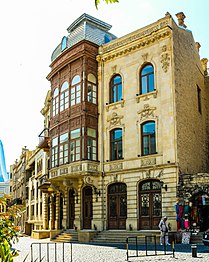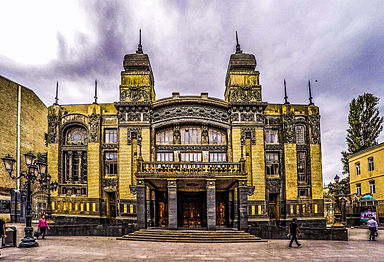Nikolai Bayev
Nikolai Bayev | |
|---|---|
 | |
| Born | October 6, 1875 Astrakhan, Russia |
| Died | August 5, 1952 (aged 76) |
| Nationality | Armenian |
| Occupation(s) | Architect, civil engineer[1] |
Nikolay Georgievich Bayev (Template:Lang-ru; Template:Lang-hy, Nikoghayos Gevorki Bayev;[1][2] October 6, 1875 – August 5, 1952) was an Armenian[1] architect, who mainly worked in Baku in the 1910s and in Soviet Armenia since the 1920s.
Biography
Baev was born in Astrakhan on September 12, 1875. He was a relative and childhood friend of Mariinsky Opera singer Nadezhda Papayan.[3] He studied in local gymnasium and when studying he also expressed love towards arts, music and painting. Bayev attended the Saint Petersburg Institute of Civil Engineering, from which he graduated in 1901.[1] From 1911 to 1918 he worked as the main architect of Baku.[4] During this period he constructed more than 100 buildings in Baku, including the Great Theatre of the Mailov Brothers (modern days Azerbaijan State Opera Theatre, 1911),[5] Sabunchi Railway Station,[6][7][8] a residential sector in the former Ermenikend area of Baku,[9] and other buildings.[10][11]
In 1927[1] Bayev moved to Yerevan and from 1929 to 1930 worked as the head of ArmSelStroy[12] (Armenian agency for rural construction), where he constructed about 200 buildings, among them Pioneer's Palace of Yerevan,[13] State Bank of Armenian SSR, Ministry of Justice, Yerevan Mechanical factory, old hall of Sundukyan Theatre, "Ararat" trust buildings, etc.[14][9] In 1945 he was awarded by the Honorary diploma of the Presidium of the Supreme Soviet of the Armenian SSR.
He was a member of Armenian Union of Architects (1942).[15] Bayev's personal archive (1896-1952) is a part of Yerevan State Archive.[12]
-
The former State Bank of Armenia building, Yerevan
References
- ^ a b c d e f Zhukov, V. Yu. "Баев Николай Георгиевич (Никогайос Геворкович)" (in Russian). Saint-Petersburg State University of Architecture and Civil Engineering.
- ^ Yesayan, Anahit (4 February 2013). "Բաքվի լավագույն բազմաթիվ շենքեր հայ ճարտարապետներն են կառուցել". Aravot (in Armenian).
...Նիկողայոս Բաև...
- ^ Nadezhda Papai︠a︡n, by Vardan Samveli︠a︡n, Yerevan, Izd-vo "Aiastan,", 1965, p. 12
- ^ "Armenia - Russia: The dialogue in the space of artistic culture" (PDF) (in Russian). State Institute of Cultural Studies. November 2010. p. 16. Archived from the original (PDF) on October 26, 2014.
...Н. Баев — городской архитектор Баку...
- ^ The Grove Encyclopedia of Islamic Art and Architecture: Delhi to Mosque By Jonathan M. Bloom, Sheila Blair, p. 238
- ^ "(in Russian) L. Bretanitski, "Baku", 1970" (PDF). Archived from the original (PDF) on 2012-12-09. Retrieved 2013-03-02.
- ^ Архитектура железнодорожных вокзалов: Евгений Васильевич Васильев, Николай Николаевич Щетинин, 1967, p. 37
- ^ Socialist Realism Without Shores, by Thomas Lahusen and Evgeny Dobrenko, 1997, Duke University Press, ISBN 0-8223-1941-1, p. 97
- ^ a b Armenian Concise Encyclopedia, Ed. by acad. K. Khudaverdian, Yerevan, 1990, Vol. 1, p. 446-447
- ^ Архитекторы Азербайджана 19 и начала 20-го века. Татьяна Надеждина
- ^ Баев Николай Георгиевич – архитектор
- ^ a b Bayev. Archival references. RusArchives.ru Archived 2013-01-27 at the Wayback Machine
- ^ Ереван: очерк истории, экономики и культуры города - Абель Рогноси Симонян - 1965, p. 247
- ^ (2005) Who is who: Armenians, Armenian encyclopedia. 2005, Yerevan, pp. 191-192
- ^ "Biography, Armenian Union of Architects". Archived from the original on 2015-12-08. Retrieved 2015-10-09.
Bibliography
- Edmond Tigranyan «Activity of Armenian architects in South Caucasus», Yerevan, 2003 - ISBN 978-99930-0-052-5
- (in Russian) Ерканян В.С. Армянская культура в 1800-1917 гг. / Пер. с арм. К.С. Худавердяна. Ер., 1985
- (in Armenian) The Historical-Cultural Heritage of the Armenian Highland, International Conference, Armenia, 2012 / The Role of Armenian Architects in the Formation of Architectural image of City Baku, by Ter-Minasyan A., National Academy of Sciences of the Republic of Armenia, Institute of Arts



